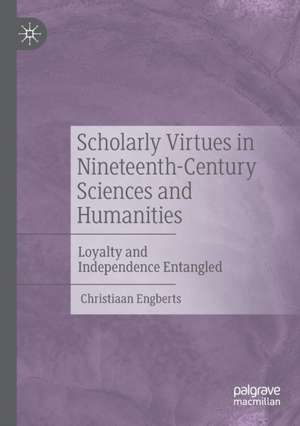Scholarly Virtues in Nineteenth-Century Sciences and Humanities: Loyalty and Independence Entangled
Autor Christiaan Engbertsen Limba Engleză Paperback – 13 noi 2022
| Toate formatele și edițiile | Preț | Express |
|---|---|---|
| Paperback (1) | 777.50 lei 6-8 săpt. | |
| Springer International Publishing – 13 noi 2022 | 777.50 lei 6-8 săpt. | |
| Hardback (1) | 782.76 lei 6-8 săpt. | |
| Springer International Publishing – 13 noi 2021 | 782.76 lei 6-8 săpt. |
Preț: 777.50 lei
Preț vechi: 948.18 lei
-18% Nou
Puncte Express: 1166
Preț estimativ în valută:
148.78€ • 159.09$ • 124.05£
148.78€ • 159.09$ • 124.05£
Carte tipărită la comandă
Livrare economică 17 aprilie-01 mai
Preluare comenzi: 021 569.72.76
Specificații
ISBN-13: 9783030845681
ISBN-10: 3030845680
Pagini: 226
Ilustrații: VII, 226 p.
Dimensiuni: 148 x 210 mm
Greutate: 0.31 kg
Ediția:1st ed. 2022
Editura: Springer International Publishing
Colecția Palgrave Macmillan
Locul publicării:Cham, Switzerland
ISBN-10: 3030845680
Pagini: 226
Ilustrații: VII, 226 p.
Dimensiuni: 148 x 210 mm
Greutate: 0.31 kg
Ediția:1st ed. 2022
Editura: Springer International Publishing
Colecția Palgrave Macmillan
Locul publicării:Cham, Switzerland
Cuprins
1. Introduction.- 2. Criticism and Mutual Support in Private Correspondence.- 3. The Eye of the Editor.- 4. A Review of Book Reviews.- 5. Praise and Criticism in Letters of Recommendation.- 6. Conclusion: A Moral Economy of Scholarship.- 7. Epilogue.
Notă biografică
Christiaan Engberts is a Lecturer in Cultural History at Utrecht University in the Netherlands, having previously studied at Leiden University’s Institute for History. His research revolves around the values, attitudes and work environments of scholars in the humanities, social sciences, natural sciences and medicine.
Textul de pe ultima copertă
Reflecting a growing interest in the history of knowledge, this book explores the importance of scholarly virtues during the late nineteenth century. The practice of science is moulded on notions of scholarly values, such as diligence, impartiality, meticulousness and patience, but here, the author focuses on the virtues of collegial loyalty and critical independence. By analysing how virtues were reflected in day-to-day scholarly work, and examining the possibility that these virtues may have come into conflict with each other, this book sheds light on what is often described as ‘the moral economy of scholarship,’ a metaphor which draws attention to the changeability of the expectations raised by virtue. Highlighting the pre-eminence and exemplary nature of German scholarship during the nineteenth century, the author provides a detailed analysis of four evaluative practices used by scholars across the humanities, social sciences and natural sciences in a number of German universities.This allows a nuanced understanding of the complex relationship between collegial loyalty and critical independence in the academic working environment, and draws comparisons across varying disciplines. A welcome contribution to a growing field of research, this book provides a comparative and transdisciplinary overview of scholarly virtues and will be of interest to those researching the history of science and the humanities.
Caracteristici
Draws attention to potential tensions arising from shared conceptions of good scholarship Allows for a nuanced picture of similarities and differences in conception of scholarly virtue across disciplines Connects ideals of scholarship and scholarly virtue to everyday evaluative practices of scholarship
